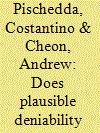| Srl | Item |
| 1 |
ID:
192519


|
|
|
|
|
| Summary/Abstract |
States conduct unclaimed coercive acts, imposing costs on adversaries to signal resolve but denying (or not claiming) responsibility. Some scholars posit that unclaimed acts have considerable potential to coerce targets, while containing escalation risks. Others suggest that unclaimed coercive efforts tend to fail and trigger escalation. We assess these competing perspectives about the effects of unclaimed attacks with a vignette experiment exposing US-based respondents to a scenario where, after Russia warns of unpredictable consequences if NATO continues providing weapons to Ukraine, an explosion occurs at a NATO base in Poland used to funnel weapons to Ukraine. Intelligence agencies and independent analysts identify Russia as the likely culprit, while not ruling out the possibility of an accident. We randomize whether Russia claimed or denied responsibility for the explosion and find that unclaimed acts have lower coercive leverage than claimed ones, but the two do not significantly differ in escalation risk.
|
|
|
|
|
|
|
|
|
|
|
|
|
|
|
|
| 2 |
ID:
186096


|
|
|
|
|
| Summary/Abstract |
Despite its prominence as a tool of statecraft, covert action’s defining characteristic – plausible deniability – remains a slippery concept. This article investigates the logics underlying the two main variants. The first ideal-type, the state model, captures efforts by states to disclaim sponsorship of covert operations. The drivers of covert action are primarily international, the sources of exposure are many, and its relationship with democratic norms is harmonious. The second ideal-type, the executive model, describes efforts to shield chief executives from blame. The drivers of covert action are domestic, the sources of exposure are limited, and its relationship with democracy is conflictual.
|
|
|
|
|
|
|
|
|
|
|
|
|
|
|
|